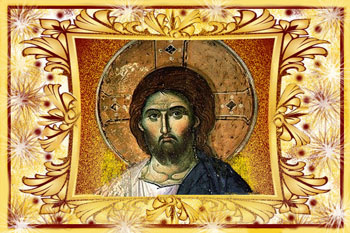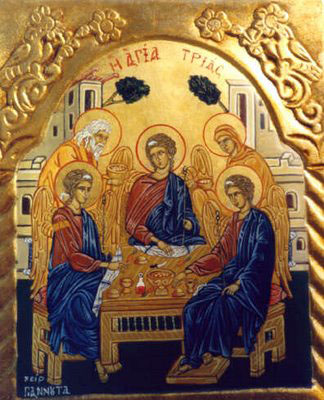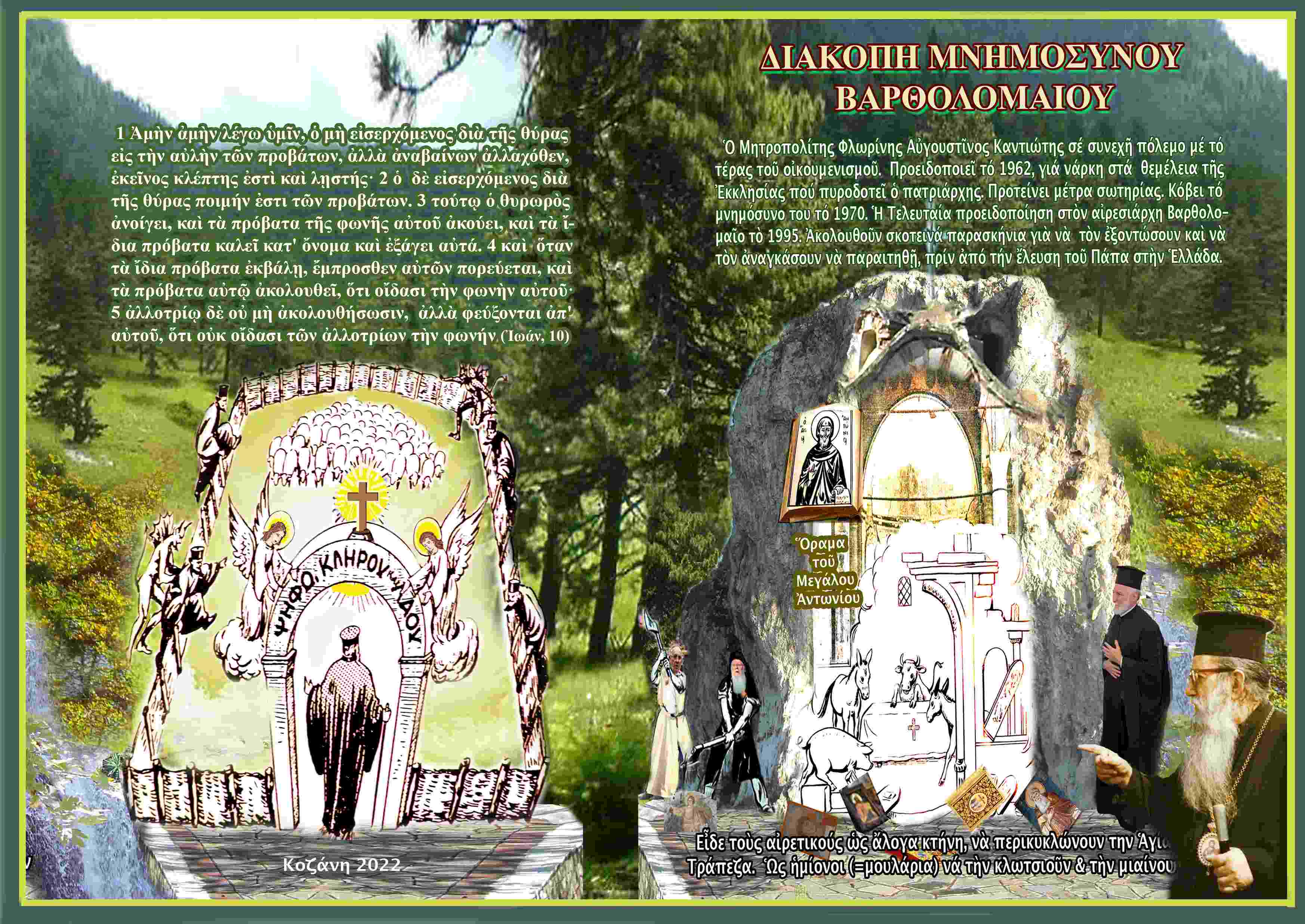ΤΙΣ ΘΕΟΣ ΜΕΓΑΣ ΩΣ Ο ΘΕΟΣ ΗΜΩΝ
 Ιούν 11th, 2011 |
Ιούν 11th, 2011 |  Filed under: εορτολογιο
Filed under: εορτολογιο
Δευτέρα τοῦ ἁγίου Πνεύματος
«ΤΙΣ ΘΕΟΣ ΜΕΓΑΣ ΩΣ Ο ΘΕΟΣ ΗΜΩΝ;»
«Τίς Θεὸς μέγας ὡς ὁ Θεὸς ἡμῶν; σὺ εἶ ὁ Θεὸς ὁ ποιῶν θαυμάσια (μόνος)» (Ψαλμ. 76,14-15)
 ΣΗΜΕΡΑ, ἀγαπητοί μου, εἶνε μεγάλη ἑορτὴ καὶ πανήγυρις. Ἑορτάζει τὸ Πνεῦμα. Ὄχι ἁπλῶς τὸ πνεῦμα. Ὑπάρχει πνεῦμα μὲ πῖ μικρὸ καὶ Πνεῦμα μὲ πῖ κεφαλαῖο.
ΣΗΜΕΡΑ, ἀγαπητοί μου, εἶνε μεγάλη ἑορτὴ καὶ πανήγυρις. Ἑορτάζει τὸ Πνεῦμα. Ὄχι ἁπλῶς τὸ πνεῦμα. Ὑπάρχει πνεῦμα μὲ πῖ μικρὸ καὶ Πνεῦμα μὲ πῖ κεφαλαῖο.
Στὴν ἁγία Γραφὴ πνεῦμα (μὲ μικρὸ πῖ) ὀνομάζεται ὁ ἀέρας, ποὺ εἶνε μὲν ἀόρατος, ἀλλὰ γίνεται αἰσθητὸς ἀπὸ τὰ ἀποτελέσματά του. Σὲ ἄλλα χωρία πνεῦμα ὀνομάζεται ὁ ἄνθρωπος, ἡ ψυχὴ τοῦ ἀνθρώπου, ἰδίως ὅταν σκέπτεται τὰ μεγάλα καὶ τὰ ὑψηλά. Ἐπίσης πνεύματα ἄυλα ὀνομάζονται οἱ ἄγγελοι καὶ ἀρχάγγελοι. Ἀλλὰ στὴν κορυφὴ ὅλων τῶν ἀΰλων πνευμάτων εἶνε ὁ Θεός. Αὐτὸ εἶνε ἀποκάλυψις τῆς ἁγίας Γραφῆς. Ἐκεῖ ὑπάρχει τὸ σπουδαιότατο ἐκεῖνο ῥητὸ ποὺ εἶπε ὁ Χριστὸς παρὰ τὸ φρέαρ Συχάρ, ὅτι «Πνεῦμα ὁ Θεός, καὶ τοὺς προσκυνοῦντας αὐτὸν ἐν πνεύματι καὶ ἀληθείᾳ δεῖ προσκυνεῖν» (Ἰωάν. 4,23). Πνεῦμα εἶνε ὁ Θεός. Καὶ Πνεῦμα ἅγιον (μὲ πῖ κεφαλαῖο) λέγεται εἰδικῶς τὸ τρίτο πρόσωπο τῆς Θεότητος, τοῦ Τριαδικοῦ Θεοῦ. Δὲν εἶνε δηλαδὴ ἕνας μῦθος, μία θεωρία, μία ἰδέα πλατωνικὴ ἢ κάτι ἄλλο, ἀλλὰ εἶνε μία ὀντότης, μία ὑπόστασις, ἕνα πρόσωπο τὸ Πνεῦμα τὸ ἅγιο ποὺ ἑορτάζουμε σήμερα.
* * *
Ποιός, ἀδελφοί μου, αἰσθάνεται τὸ μεγαλεῖο τῆς σημερινῆς ἡμέρας; Ἂς εἴμεθα εἰλικρινεῖς· ψυχροὶ καὶ ἀδιάφοροι στεκόμαστε ἐμπρὸς στὸ μέγα τοῦτο μυστήριο. Γιατί; τί συμβαίνει; Ἀπαντῶ διὰ παραδείγματος. Ὅποιος ἔχασε τὴν αἴσθησι τῆς ὀσφρήσεως, καὶ ἂν ἀκόμα τὸν βάλῃς μέσα σ᾽ ἕνα περιβόλι γεμᾶτο ἄνθη, δὲν αἰσθάνεται καμμία εὐωδία. Κι ὅποιος ἔχασε τὴν αἴσθησι τῆς ἀκοῆς, κι ἂν ἀκόμα βρίσκεται ἐνώπιον συναυλίας Μπετόβεν, τίποτα δὲν ἀκούει. Κι ὅποιος ἔχασε τὴν ὅρασί του, δὲν εἶνε εἰς θέσιν νὰ δῇ τί μεγαλεῖο ἔχει ἡ χαραυγὴ τοῦ ἡλίου. Ὅπως λοιπὸν αὐτοὶ ποὺ χάνουν τὶς αἰσθήσεις δὲν ἀντιλαμβάνονται τὰ μεγαλεῖα τῆς φύσεως, κατὰ παρόμοιο τρόπο κι αὐτοὶ ποὺ ἔχουν χάσει τὴν πίστι τὴν ὀρθόδοξο, τὴν ἕκτη αἴσθησι, δὲν εἶνε δυνατὸν νὰ αἰσθανθοῦν τὰ μεγαλεῖα τοῦ ὑπερφυσικοῦ, τοῦ ὑπερπέραν, τοῦ πνευματικοῦ κόσμου.
Ἀλλὰ τώρα δὲν εἴμεθα μόνο ψυχροὶ καὶ ἀδιάφοροι ἀπέναντι τοῦ μυστηρίου τῆς ἁγίας Τριάδος καὶ τοῦ ἁγίου Πνεύματος εἰδικώτερον· στὶς ἡμέρες μας παρουσιάστηκαν καὶ ἐμπαῖκται καὶ χλευασταὶ καὶ βλάσφημοι τοῦ ἁγίου Πνεύματος. Ποτέ ἄλλοτε στὴν ἱστορία τοῦ γένους μας δὲν παρουσιάστηκε τέτοιο φαινόμενο. Γιὰ ν᾽ ἀντιληφθῆτε τὸ μέγεθος τῆς βλασφημίας, σᾶς ἀναφέρω τὸ ἑξῆς. Τὰ συντάγματα τῆς πατρίδος μας ἀπὸ τοῦ 1821 μέχρι σήμερα, ὅλα, ἔχουν κάτι μοναδικὸ στὸν κόσμο. Ἐνῷ τῶν ἄλλων λαῶν τὰ συντάγματα ἀρχίζουν «Εἰς τὸ ὄνομα τοῦ λαοῦ» ἢ κάτι ἄλλο παρόμοιο, τὸ ἑλληνικὸ εἶνε τὸ μόνο σύνταγμα ποὺ ἀρχίζει «Εἰς τὸ ὄνομα τῆς ἁγίας καὶ ὁμοουσίου καὶ ἀδιαιρέτου Τριάδος». Αὐτὰ ὁμολογοῦμε· ὅτι παραπάνω ἀπὸ τὸν πρωθυπουργὸ καὶ τὸν πρόεδρο δημοκρατίας, παραπάνω ἀπ’ ὅλα εἶνε ἡ ἁγία Τριάς. Ἁγία Τριάς, ἐλέησον τὸν κόσμον! Ἀλλ’ ἐνῷ αὐτὴ εἶνε ἡ πίστι τῶν προγόνων μας, βρέθηκε τώρα κάποιος ὁ ὁποῖος στὰ γραπτά του ἐμπαίζει καὶ χλευάζει μὲ τὸν αἰσχρότερο τρόπο τὴν ἁγία Τριάδα. Κι ὅμως τὰ ἔργα τοῦ ἀνθρώπου αὐτοῦ διδάσκονται στὰ σχολεῖα μας, γιὰ νὰ διαπλασθῇ μία νέα γενεὰ ποὺ νὰ μὴ πιστεύῃ στὴν ἁγία Τριάδα. Ὁ συγγραφεὺς αὐτὸς εἶνε ὁ Καζαντζάκης, τὸν ὁποῖο πολλοὶ θαυμάζουν.
Καταντήσαμε ἔθνος ἀντιφάσεων· ἐνῷ ἀπὸ τὸ ἕνα μέρος ὁμολογοῦμε ὅτι στὴν κορυφὴ εἶνε ἡ ἁγία Τριάς, ἀπὸ τὸ ἄλλο ἐπιτρέπουμε σὲ διαφόρους ὄχι μόνο νὰ ἀρνοῦνται τὸ ὕψιστο μυστήριο ἀλλὰ καὶ νὰ τὸ βλασφημοῦν.
Ἀλλ’ ὅποιος δὲν πιστεύει στὸ Θεὸ θὰ πιστέψῃ στὸν διάβολο. Καὶ ἡ σημερινὴ ἀνθρωπότης, ὅπως εἶπε ἕνας Γάλλος φιλόσοφος, δὲν πιστεύει στὴν ἁγία Τριάδα· πιστεύει – ποῦ; Σὲ μιὰ ἄλλη τριάδα, σατανική. Ποιά εἶνε ἡ σατανικὴ τριάς; Τρεῖς θεοὶ – τρία εἴδωλα. Ἕνα εἶνε τὸ χρῆμα, τὰ τριάκοντα ἀργύρια, ὁ μαμωνᾶς. Δεύτερο εἶνε ἡ γροθιά, ποὺ ὑψώνεται νὰ θρυμματίσῃ τὸν ἀντίπαλο, ἡ βία. Καὶ τρίτο εἶνε τὸ σέξ, ἡ αἰσχρὰ ἡδονὴ τῆς σαρκός. Σ᾽ αὐτὴ τὴν σατανικὴ τριάδα πιστεύουν σήμερα πολλοί.
Ἀλλ’ ἐγὼ δὲν ἀπευθύνομαι σὲ ἀπίστους· ἀπευθύνομαι σὲ πιστούς. Καὶ παρακαλῶ τὴν ἁγία Τριάδα, ἡ σπίθα αὐτὴ τῆς πίστεως νὰ μὴ σβήσῃ, ἀλλὰ νὰ γίνῃ φλόγα πυρός, ἀπὸ τὶς γλῶσσες ἐκεῖνες ποὺ φάνηκαν στὸ ὑπερῷο ὅταν κατῆλθε τὸ Πνεῦμα τὸ ἅγιο στοὺς δώδεκα ἀγραμμάτους μαθητάς.
Οἱ δώδεκα ἀπόστολοι κατώρθωσαν ἔργο μεγαλύτερο τοῦ Πλάτωνος καὶ τοῦ Ἀριστοτέλους, μεγαλύτερο τοῦ Μεγάλου Ἀλεξάνδρου· ἀνεγέννησαν τὸν κόσμο. Πῶς, μὲ ποιά δύναμι; Μόνο μὲ τὴ δύναμι τοῦ Θεοῦ. «Τίς Θεὸς μέγας ὡς ὁ Θεὸς ἡμῶν; σὺ εἶ ὁ Θεὸς ὁ ποιῶν θαυμάσια (μόνος)» (Ψαλμ. 76,14-15).
Εἶνε ἀσύλληπτο τὸ μυστήριο τῆς Πεντηκοστῆς, ὅπως ψάλλει ἡ Ἐκκλησία μας· «καὶ τὸ μυστήριον ὅσον; ὡς μέγα τε καὶ σεβάσμιον!» (στιχηρ. ἑσπερ. Πεντ.). Ὁ ἱερὸς Αὐγουστῖνος, πατὴρ τῆς Δύσεως καὶ τῆς οἰκουμένης ὁλοκλήρου, ἕνα ἀπὸ τὰ δέκα μεγαλοφυέστερα πνεύματα τῆς ἀνθρωπότητος, φιλοσόφησε ἐπὶ τοῦ μυστηρίου τῆς ἁγίας Τριάδος. Καὶ τὸ συμπέρασμά του στὸ τέλος ποιό ἦταν· Παραδίδω τὰ ὅπλα, εἶνε ἀδύνατον ἡ ἀνθρωπίνη διάνοια νὰ εἰσέλθῃ στὸ μέγα τοῦτο μυστήριο… Ἐὰν μπορῇ σ᾽ ἕνα ποτήρι τοῦ νεροῦ νὰ χωρέσῃ ἡ θάλασσα, τότε θὰ μπορέσῃ καὶ τὸ μικρὸ μυαλὸ τοῦ ἀνθρώπου νὰ ἐννοήσῃ τὸ μέγα μυστήριο. Σκουλήκια ποὺ ἕρπουν ἐνώπιον τοῦ ἱεροῦ μυστηρίου, μόλις διὰ τῶν κεραιῶν τῆς πίστεως τὸ προσεγγίζουμε καὶ κλίνοντες γόνυ λέμε· Ἁγία Τριάς, ἐλέησον τὸν κόσμον· ἁγία Τριάς, ἐλέησον καὶ τὴν πατρίδα μας, ποὺ συνεστήθη «εἰς τὸ ὄνομα τῆς ἁγίας καὶ ὁμοουσίου καὶ ἀδιαιρέτου Τριάδος». Γι’ αὐτό, ἐφ᾽ ὅσον θὰ ὑπάρχουν ἄστρα καὶ θ’ ἀνατέλλῃ ὁ ἥλιος καὶ θὰ ῥέουν οἱ ποταμοὶ καὶ θὰ θάλλουν οἱ δάφνες, ὁ λαός μας, ὁ Ἑλληνικὸς λαός, δὲν θὰ λατρεύσῃ τὴν σατανικὴ τριάδα, οὔτε τὸ χρῆμα οὔτε τὴν ἡδονὴ οὔτε τὴ βία· θὰ πιστεύῃ στὸ Πνεῦμα τὸ ἅγιο, τὸ προσκυνητὸν εἰς τοὺς αἰῶνας τῶν αἰώνων.
* * *
Πρὶν τελειώσω θέλω νὰ σᾶς μεταφέρω μία παραστατικὴ εἰκόνα γιὰ τὸν πλοῦτο τῶν εὐλογιῶν τοῦ ἁγίου Πνεύματος. Στὸ τεσσαρακοστὸ ἕβδομο (μζ΄) κεφάλαιο τοῦ προφήτου Ἰεζεκιὴλ ὑπάρχει τὸ ἑξῆς ὅραμα. Ὁ προφήτης βλέπει ἀπὸ τὴν ἀνατολικὴ πλευρὰ τοῦ ναοῦ τῆς πόλεως του Κυρίου νὰ βγαίνῃ μιὰ φλέβα νεροῦ καὶ νὰ σχηματίζῃ ποτάμι. Τὸ ποτάμι στὴν ἀρχὴ τρέχει ἥσυχα καὶ τὸ νερό του φτάνει μέχρι τοὺς ἀστραγάλους τοῦ προφήτου. Μετὰ ἀπὸ ὡρισμένο διάστημα τὸ ῥεῦμα ἀρχίζει ν’ αὐξάνεται καὶ φτάνει τότε μέχρι τοὺς μηρούς του. Μετὰ ἀπὸ λίγο ὑψώνεται ἀκόμη περισσότερο καὶ καλύπτει τὴ μέση του. Τέλος, καθὼς συνεχῶς μεγαλώνει, κάνει τὸ ποτάμι ἀδιάβατο. Ὁ προφήτης θαυμάζει, καὶ ὁ θαυμασμός του γίνεται μεγαλύτερος ὅταν δεξιὰ καὶ ἀριστερὰ στὶς ὄχθες τοῦ ποταμοῦ βλέπει νὰ ἔχῃ ἀναπτυχθῆ πλουσιωτάτη καὶ ἀειθαλὴς βλάστησι. Πλῆθος δέντρα καὶ οἱ καρποί τους πλούσιοι. Καὶ ὅταν ὁ ποταμὸς φτάνει στὶς ἐκβολές, τὸ ζωογόνο ῥεῦμα του κάνει τὴ θάλασσα νὰ γεμίζη ἀπὸ ψάρια. Ἄφθονα ψάρια, καὶ ἁλιευτικὰ συνεργεῖα ῥίχνουν τὰ δίχτυα τους καὶ ψαρεύουν.
Τί σημαίνει τὸ ὅραμα; ποιό εἶνε τὸ ποτάμι αὐτό; Εἶνε ἡ Ἐκκλησία μας. Ξεκίνησε ἀπὸ μία μικρὴ φλέβα, μιὰ φούχτα ἀγράμματους ψαρᾶδες. Οἱ δώδεκα ἔγιναν ἑκατὸν εἴκοσι, οἱ ἑκατὸν εἴκοσι τρεῖς χιλιάδες, οἱ τρεῖς χιλιάδες πέντε χιλιάδες, οἱ πέντε χιλιάδες ἑκατομμύρια. Σήμερα ὅπου νὰ πᾶτε, εἴτε στὴ Σαχάρα εἴτε στὸ Βόρειο Πόλο, ὑπάρχουν Χριστιανοὶ ὀρθόδοξοι ποὺ πιστεύουν. Καὶ στὶς πέντε ἠπείρους οἱ εὐγενέστερες ψυχὲς πιστεύουν στὸ Εὐαγγέλιο ὀρθοδόξως. Ἀπὸ μία φλέβα ἔγινε ὁ μεγάλος αὐτὸς καὶ ἀστείρευτος ποταμός, ἡ ἁγία μας θρησκεία. «Τίς Θεὸς μέγας ὡς ὁ Θεὸς ἡμῶν; σὺ εἶ ὁ Θεὸς ὁ ποιῶν θαυμάσια (μόνος)».
Κι ὄχι μόνο ποσοτικῶς ἀλλὰ καὶ ποιοτικῶς αὐξήθηκε ὁ χριστιανισμός. Καὶ αὐτὸ εἶνε τὸ σπουδαιότερο. Ἄπιστε καὶ ἄθεε, ἔλα νὰ μοῦ ἐξηγήσῃς ἕνα φαινόμενο· μπορεῖ ἕνας λαγὸς νὰ γίνῃ λιοντάρι; Καὶ ὅμως ἔγινε. Ποιός ἦταν ὁ λαγός; Ὁ Πέτρος. Αὐτός, ποὺ φοβήθηκε ἐμπρὸς σὲ μιὰ ὑπηρέτρια καὶ ἀρνήθηκε, σήμερα κηρύττει ἐνώπιον ὅλου τοῦ κόσμου!
* * *
Δὲν ὑπάρχει, ἀδελφοί μου, δὲν ὑπάρχει ἄλλη θρησκεία σὰν τὴ δική μας, δὲν ὑπάρχει τίποτε σὰν τὸ μεγαλεῖο τῆς ἁγίας Τριάδος. Πιστεύετε! Κι ἂν ἀκόμα ὅλος ὁ κόσμος γονατίσῃ καὶ προσκυνήσῃ τὴν τριάδα τοῦ διαβόλου, ἐσεῖς νὰ μὴ γονατίσετε! Ἀλλὰ καὶ σήμερα καὶ αὔριο καὶ εἰς τοὺς αἰῶνας νὰ λατρεύετε τὴν ἁγία Τριάδα. Ἁγία Τριάς, ἐλέησον τὸν κόσμον. Ἁγία Τριάς, ὁ Πατὴρ ὁ Υἱὸς καὶ τὸ ἅγιον Πνεῦμα, σκέπε τὰ τέκνα σου· ἀμήν.
† ἐπίσκοπος Αὐγουστῖνος
(Ομιλία του Μητροπολίτου Φλωρίνης π. Αυγουστίνου Καντιώτου στον ιερό ναό της Ἁγίας Τριάδος Πτολεμαΐδος 14-6-1976)
email για την εορτή της Αγίας Τριάδος που παραλάβαμε
απο τον ιερέα patir Nikodimos Sotiriou, γραμμένο στα Αγγλικά
_______
Subject: Ta Onomastiria tou Theou mas
Message Body:
The Nameday of our God
 Today is the exclusive Nameday of our God. Although there are three Names, for three separate Persons, yet One Nameday, One God, not three Gods.
Today is the exclusive Nameday of our God. Although there are three Names, for three separate Persons, yet One Nameday, One God, not three Gods.- Christ defined this in a very mysterious paradox way, when instructing the Apostles: «to make disciples by baptising them in the ‘name’ (in Singular, not ‘names’ in Plural, though He lists 3 Names) of the Father, the Son and the Holy Spirit.» This unusual Singular is contrary to the laws of Grammar but also contrary to human logic.
- Those who stubbornly attempt to analyse God under the prism of human logic, deprive themselves from a spiritual insight, they restrict themselves from an examination of things unseen and exclude themselves from a heavenly awakening: FAITH.
- Faith, not in general, as a value or an idea or concept, but a living Faith in the living God. How is this faith acquired? With the fundamental prerequisite, the absolute acknowledgment that there is Only One True God, then there is also One True Faith. Not a specific version of a person or a nation, but God’s version, a Faith revealed by God. A Proper Faith, a Correct Creed, a Fitting Worship, just as God wanted it, just as He intended it to be: ORTHODOXY.
- Lets us now carefully examine these two, logic and faith, so we can then dare to approach the Mystery of the Holy Trinity, and may God forgive us this daring audacity, since the capacity, strength and boundaries of human intellect are very limited indeed.
- There are 3 levels of logic:
- a. the illogical or para-logical (insensible, crazy),
- b. the logical (sensible, comprehensible) and
- c. the hyper-logical (super-logical, above human concept).
- Faith only belongs to this specific third dimension and should never be wrongly, unfairly attributed to any of the first two spheres. Faith does not oppose science or logic, faith does not contradict our intellect. Faith is a spiritual substance, not a scientific result of intellectual process. Faith is a hypostasis of the soul, not a thesis or stance of academic development.
- Faith is a dimension of an illuminated mind and a superhuman strength of a humbled heart, not a praiseworthy achievement of arrogant thought. Faith is a God-given, God-sent gift. It cannot be gained by human effort, exchanged by human offering; it cannot be obtained by deceit or cunningly bought. Faith can never be created or cultivated in a deceived, heretical or blasphemous existence. One would need to have a preliminary awareness of existence as well as an incorrupt faith of the One True God, Jesus Christ, before he can explain (if ever) or describe the Mystery of Holy Trinity, the relation and interaction of these Divine Persons sharing that One Divinity. One would need to experience a revelation of divine grace, subject to a purified body & soul.
- Therefore the Mystery of the Holy Trinity is not subject to study. It cannot ever be defined or confined in formula terms. We only dare to describe in a poor failed attempt, in limited sinful reasoning.
- The Holy Trinity cannot be, and is forbidden to be depicted, since not all three Persons have incarnated but only One, the Son. Therefore, the only accepted, canonical Icon of the Holy Trinity, is the Three Angels at the Hospitality of Abraham.
- All other Icons of the Holy Trinity are illegal and banned by the Holy Fathers of the 7th Ecumenical Council, especially the forbidden image that depicts the Father as ‘an old man’, the Son as a Human and the Holy Spirit as a Dove. The Father has never incarnated, never took up the Human Nature, is not “an old man” and therefore can never be drawn as a Human. The Biblical term “the old one of ancient days” (Daniel 7:9, 13, 22) does not refer to age, as some erroneously assume, (does not even necessarily refer to the Father) but to the pre-eternity and ever-existence of God. The Holy Spirit is not a Dove nor a burning bush and should only be depicted as such when the actual Icon narrates the specific Event in which these appearances took place, in those specific forms.
- On this Special Feast Day, the actual Nameday of our God, we take chance to glorify Him for revealing Himself to us, for allowing us to know Him, to be with Him, in Him, in His One True Church, the Holy Orthodox Church. This is the proper fitting glory. This is the incomparable, unsurpassed magnitude of Orthodoxy. God is Orthodox. And if we also want to be truly Orthodox, we must evolve and revolve around the recognition and glory of the Holy Trinity. Every action, every decision, every prayer or movement that we make, must always begin with the secret invocation of the blessed, Biblical citation: «In the Name of the Father, the Son and the Holy Spirit, amen.»
- Today, anyone baptised in the Name (Singular, because a Plural ‘Names’ would be blasphemous) of the Holy Trinity, is especially joyous in God, for God’s Holy Nameday. Anyone leading an Orthodox Spiritual Life and has basic knowledge of Hymnography, would actually know what an “Apolytikion” really is, and which one exactly, is the Apolytikion of the Holy Trinity and weirdly enough it begins by referring to Christ: “Evloyitos i Hriste o Theos!”= May You, Christ our God, be glorified by us.” The term ‘evloyitos’ does not mean “blessed be our God” because God is already blessed and does not need our blessing, we need His, but it means that God is ought to (should) always be glorified by us, this is why it is elaborated with the completion of “Now and ever and to the ages of ages… The term ‘bless’ in the old Testament and especially in the Psalms, predominantly means ‘glorify’.
- This is also why in the Lord’s Prayer, the term “ayiashtito” also means “may it be glorified” not ‘Holy’, because God is already Holy by Nature and is the Source and ‘Distributor’ of holiness and we cannot ‘sanctify’ His Holy Name.
- God’s Holy Name, is not Jehovah, Adonai, Elohim, as these are only specific Jewish Names specifically used when referring to Jews and speaking in Jewish. God has no need of a “Passport” nor does He use any specific language in Heaven to insist on ‘Jehovah’, this in itself is a very erroneous pronunciation, the more accurate is ‘Jahveh’. When rendered in Ancient Biblical Greek, the Holy Fathers always insisted in using the Name ‘Kyrios’, Lord. The actual Name of God is not Jehovah, but just as revealed to Moses, it is “O On” = “I am He Who Is”.
- But the essential Holy Name of the Essence of God exposing the Divinity of God, is primarily, exceptionally, the One, Glorious and Exquisite, Superior and Superb Holy Name: “Father, Son & Holy Spirit.”
- To Him belongs glory and dominion eternally, amen.
Monk Nicodemus



Ιούνιος 13th, 2011 at 2:40 μμ
[…] Πηγή […]
Add A Comment
You must be logged in to post a comment.